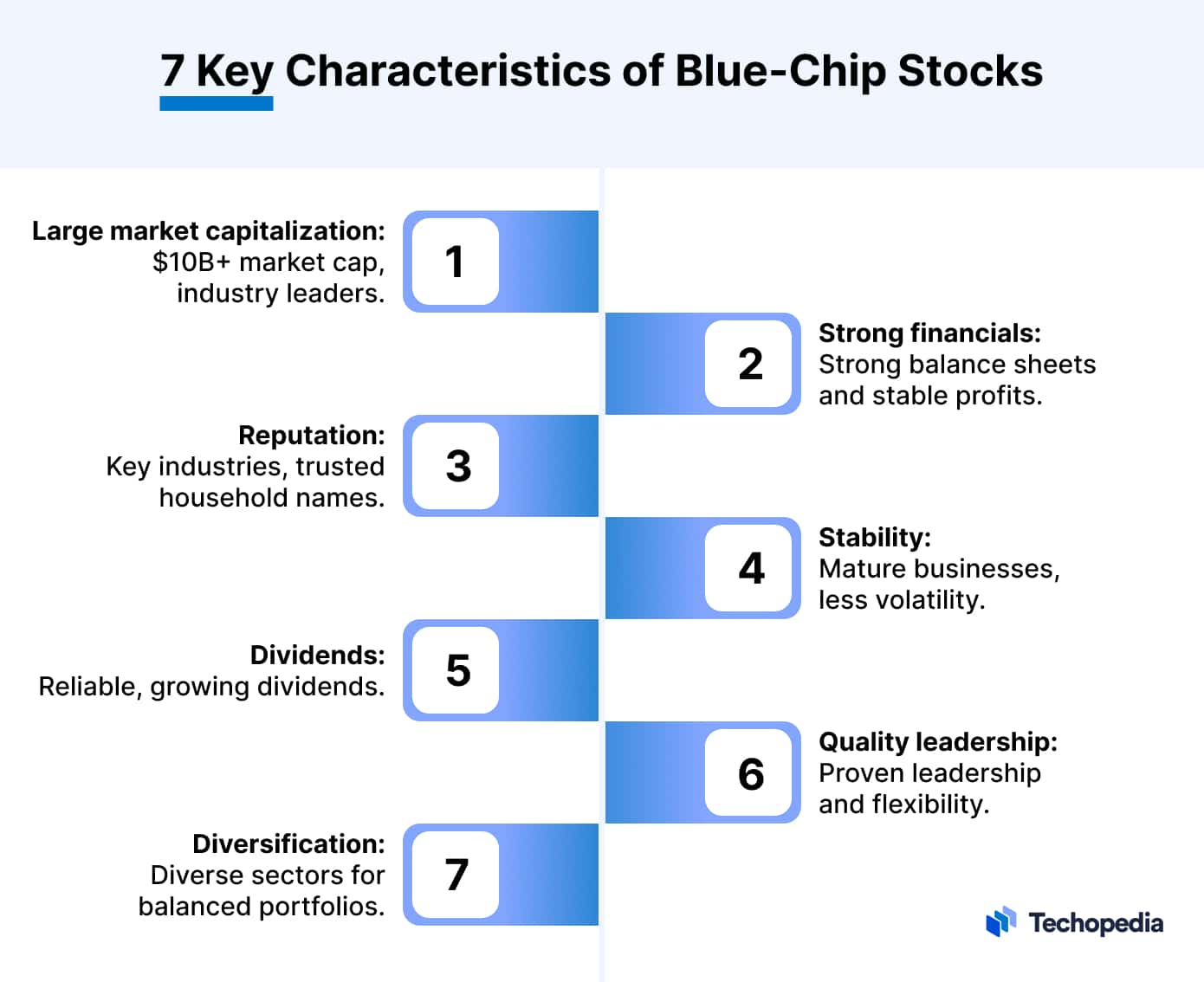What is a Blue-Chip Stock?
A blue-chip stock is an investment that represents ownership in a prominent, well-established corporation recognized for its stability and a proven track record of strong financial performance. These stocks are renowned for their reliability and ability to turn a profit, even in the most challenging economic conditions.
Below are several key characteristics of blue-chip stocks.
- Large Market Capitalization: Blue chips have market caps of over $10 billion, with many being valued at more than $100 billion. They are market leaders in their respective industries.
- Strong Financials: Blue-chip stocks have healthy balance sheets, relatively stable revenue streams, positive earnings, and predictable cash flows. They are able to consistently generate profits.
- Reputation: They operate in industries that are vital to the economy and have built trust with consumers over decades. These companies are considered household names.
- Stability: Their businesses are in a mature stage of their lifecycle. This results in less volatility and limits the impact that short-term volatility has on their share price.
- Dividends: Most blue chips pay stable and consistent dividends and increase payouts periodically.
- Quality Leadership: They are led by seasoned management teams with proven track records. Blue-chip companies have the ability to adapt to changing business environments.
- Diversification: They offer exposure to a wide variety of economic sectors and industries. This provides a healthy degree of diversification to investors’ portfolios.
Examples of Blue-Chip Stocks
Some well-known examples of blue chip stocks across sectors include:
Sector
Blue Chip Stocks
Technology
Apple, Microsoft, IBM, Intel, Cisco
Banking
JPMorgan Chase, Bank of America, Wells Fargo
Consumer Staples
Procter & Gamble, Coca-Cola, PepsiCo, Walmart
Energy
ExxonMobil, Chevron, ConocoPhillips
Industrials
Boeing, Honeywell, Lockheed Martin, General Dynamics
Healthcare
Johnson & Johnson, Pfizer, Merck, Abbott Laboratories
Many of the largest blue-chip stocks are included in major equity indexes such as the Dow Jones Industrial Average and the S&P 500 Indexes.
Benefits of Investing in Blue-Chip Stocks
There are several benefits associated with investing in blue-chip stocks:
- Stability: Mature companies are less volatile than younger growth businesses. This limits the odds of experiencing large drawdowns during market downturns.
- Dividends: Blue-chip stocks generally pay steady and predictable dividends that increase over time. This provides income for investors.
- Quality: Investing in financially sound companies with strong brands reduces investment risk.
- Diversification: Exposure to many sectors and industries reduces portfolio risk compared to investing in just a handful of stocks.
- Liquidity: Large trading volumes make buying and selling quick and easy. It also lowers bid/ask spreads and keeps price volatility in check.
- Transparency: As leaders in their industries, blue-chip stocks face significant scrutiny and provide significant financial disclosures. This mitigates the risk of corporate fraud dramatically.
- Innovation: Their large resources allow them to invest heavily in research and development to innovate and stay relevant.
Drawbacks of Blue Chip Stocks
Some potential drawbacks must also be considered when investing in blue-chip stocks:
- Expensive Valuations: High-quality blue chips often trade at premium prices compared to the broader market.
- Slow Growth: Large and mature companies may not grow as quickly as small emerging businesses. Their earnings are more stable but grow at a slower rate.
- Opportunity Cost: Focusing solely on low-volatility blue-chip stocks may result in an underperforming portfolio during bull markets as high-growth sectors like tech and communications may draw more interest.
- Changing Consumer Preferences: Even strong brands must adapt to competitive threats and changing consumer tastes over time. Blue-chip stocks are exposed to the risk of becoming obsolete enterprises if their products and services fail to keep up with consumers’ changing preferences and technological shifts.
- Global Events: Macroeconomic issues and geopolitical events can put pressure on the profitability of multinational blue-chip companies.
In a well-balanced investment portfolio, blue-chip stocks serve as a cornerstone, offering stability, a reliable source of income, and reduced risk due to their established track record.
Nevertheless, incorporating a mix of growth stocks and smaller-cap investments remains advantageous to maximize returns, especially in periods of economic expansion.
Investing in Blue Chip Stocks
There are several ways for investors to gain exposure to blue-chip stocks:
- Individual Stocks: Investors can buy shares of individual blue-chip companies that they select based on research and due diligence.
- Index Funds: These are passively managed index funds that mimic the performance of blue-chip indexes like the Dow Jones or S&P 500.
- Blue Chip Mutual Funds: Actively managed mutual funds that invest in high-quality blue chip companies.
- Dividend ETFs: Exchange-traded funds (ETFs) that hold portfolios of blue-chip dividend-paying stocks. Their shares can be easily traded as if they were regular stock.
- Robo-Advisors: Automated investment platforms that often recommend blue-chip ETFs as core portfolio holdings for hands-off investors.
- Financial Advisors: Advisors assist clients in selecting the best blue-chip stocks and funds upon considering which are the most suitable based on their financial goals and risk tolerance.
Many leading blue-chip companies have paid and increased their dividends for decades, providing a stable income stream. However, it is still important to analyze their financial performance and valuations to make sure they are trading at attractive or fair prices.
Building a diversified portfolio using low-cost mutual funds and ETFs is generally the easiest approach.
Blue Chip Stocks vs. Speculative Stocks
Blue chip stocks are quite different from speculative stocks of younger or smaller companies. Here’s how:
Aspect
Blue Chip Stocks
Speculative Stocks
Stability
Operate profitably through economic cycles.
May see dramatic fluctuations in their revenues and earnings during periods of economic distress.
Risk
Mature blue-chip stocks have lower bankruptcy or default risk.
Speculative stocks are considered riskier as their liquidity and solvency are less robust.
Volatility
Less volatile share prices
More volatile share prices
Valuation
Often enjoy higher valuations due to their profitability and the predictability of their dividend component.
Speculative stocks may not produce any earnings or distribute dividends as the business has not matured sufficiently.
Growth
Blue chips see modest but dependable growth in both revenues and earnings.
Speculative stocks may experience rapid growth, but their business model remains unproven until they can consistently turn a profit.
Dividends
Most blue-chip stocks pay dividends
Few pay dividends
Transparency
Undergo significant scrutiny from investors and regulators and disclose many details about their finances, operations, and strategic decisions.
Often provide limited data.
Innovation
Refine existing business models to keep improving and expanding their top and bottom lines.
Aim to disrupt industries.
Incorporating a selection of blue-chip stocks into your portfolio can offer a solid foundation, serving as a source of stability, generating income, and increasing diversification.
Yet, it’s equally crucial to maintain a portion of your investments in the realm of higher-risk, higher-reward speculative stocks to benefit from emerging opportunities in the marketplace.







